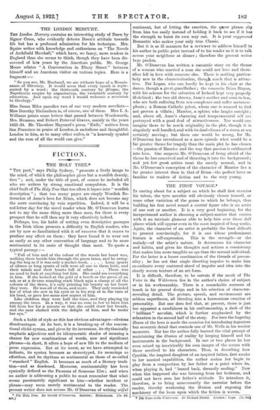FICTION.
THE HOLY TREE* "THE poet," says Philip Sydney, "presents a lively image to
the mind, of which the philosopher gives but a wordish descrip_ tion " ; and, under the title of poet, of course he included all who are writers by strong emotional compulsion. It is the
chief fault of The Holy Tree that too often it lapses into " wordish description " ; that too many pages are simply Wordish Re- iteration of Anne's love for Brian, which does not become any
the more convincing by vain repetition. Indeed, it will be a red-letter day for the novel reader when Mr. O'Donovan learns not to say the same thing more than once, for there is every prospect that he will then say it very effectively indeed. Perhaps, too, his habit of writing even descriptive passages in the Irish idiom presents a difficulty to English readers, who are by now so familiarized with it ad nauseam that it ceases to produce any effect on them : they have found it to wear out
as easily as any other convention of language and to be more sentimental in its caste of thought than most. To quote a typical passage :— "Full of him and of the colour of the woods her heart was, walking there beside him through the green lanes, and he swing- ing the bag as if it was only a pocket-book Long spurts of silence or long spurts of talk were all one to them both, and their minds and their hearts full of other . . . There was no need to look at anything but him. She could see everything in him. If she looked at the gold of a beech or the green of an ash or at a fir-tree standing stark black agin a clump of all the colours of the dawn, it's only printing his beauty on her heart they were. He was all of them, and more. They only reminded her of what she saw in his eyes or in his step or in the turn of his head, or gave her some new aspect of him.
Like children they were half the time, and they playing tig among the trees. In a way, it was an ease to her to have him hid from her for a minute so that she could draw her breath, and she near choked with the delight of him, and he under her eye."
Such a habit of style as this has obvious advantages—obvious disadvantages. At its best, it is a breaking-up of the conven- tional cliché-syntax, and gives by its inversions, its rhythmically emphatic adjectives and its idiosyncratic shades of meaning a chance for new combinations of words, new and significant phrases--in short, it offers a hope of new life to the medium of
• prose expression. But at its worst, as we have attempted to indicate, its syntax becomes as stereotyped, its meanings as effortless, and its rhythms as sentimental as those of so-called " standard " English. It becomes as much of a literary tradi-
tion—and as deadened. Moreover, sentimentality has been cynically defined as the Passions of Someone Else ; and when an author is addressing a public he must remember that what seems passionately significant to him—whether incident or phrase—may seem merely sentimental to the reader. The present writer does not accuse Mr. O'Donovan of writing wilful
• The Holy 2'ree. By Gerald. O'Donovan. London : Heinemann. Us. ed. net.]
sentiment, but of letting the emotion, the queer phrase slip from him too easily instead of holding it back to see if it haa the strength to burst its own way out. It is your suppressed Romantic who makes your only true Classic.
But it is as ill manners for a reviewer to address himself to his author in public print instead of to his reader as it is to talk across your neighbour at dinner ; therefore the present writer begs pardon.
Mr. O'Donovan has written a romantic story on the theme of a woman who married a man she could not love and there- after fell in love with someone else. There is nothing particu- larly new in the characterization, though much that is attrac- tive. Pat Logan, who can hardly be kept in his chair at the dance, though a great-grandfather ; the romantic Brian Hogan, with his scheme for the salvation of Ireland kept very properly ill-defined ; the two old shrews, Anne's mother and aunt-in-law, who are both suffering from sex-complexes and suffer metamor- phosis; a Roman Catholic priest, whom one is amazed to find not proven a villain ; Maurice, a sphinx who laughs outright ; and, above all, Anne's charming and temperamental self are portrayed with a good deal of attractiveness. Nor would one imagine there to be much originality in the plot, though it is singularly well handled, and with its final climax of a storm at sea certainly moving ; but there one would be wrong, for Mr. O'Donovan has introduced as a mere episode what would be a far greater theme for tragedy than the main plot he has chosen —the passion of Maurice and the way that passion is sublimated into love. One suspects Mr. O'Donovan of being afraid of the theme he has conceived and of thrusting it into the background ; and yet few great artists treat the merely normal, and in Mr. O'Donovan's conception of the character of Maurice lies a far greater interest than in that of Brian—the perfect lover so familiar to readers of fiction and to the very young.


































 Previous page
Previous page